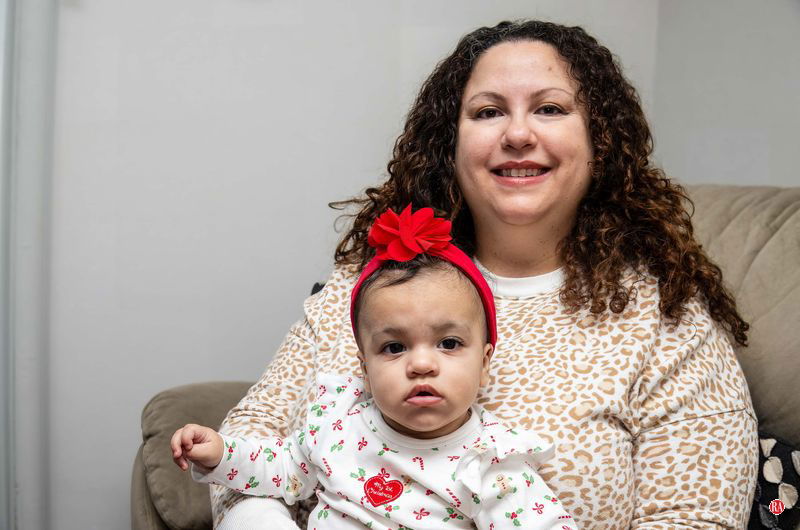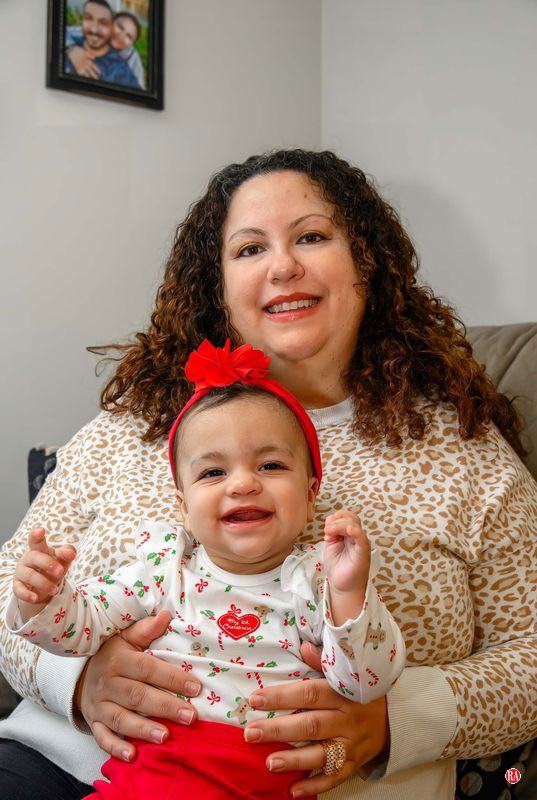
WATERBURY – Alexandria Hall-Mabrouk did not feel right. The 37-year-old mother-to-be at the time juggled two jobs, arriving at her prenatal checkup appointment overwhelmed.
“I need help,” Hall said to her doctor.
The doctor responded astounded, not sure what to do, Hall recalled.
“I was looking for some sort of support during that time and just somewhere I could turn to and they had no answer for me,” she said. “It made me feel hopeless and inadequate. A lot of times you are downplayed and told you are fine and you are just pregnant. ‘That is normal aches and pains.’ ”
Hall was not fine. She ended up changing doctors but her health continued to deteriorate, developing pre-eclampsia and having to deliver her baby via cesarean section six weeks early. She ended up in hospital several times after giving birth.
She said she believes that had her doctors found support for her early on and listened to her concerns, maybe her child would not have been born premature.

“If they had just validated my feelings and known where to refer me, my mental and emotional health would have improved and as a result, my child may have not been born prematurely,” she said.
Hall joins many Black and multiracial women in the state and city who face significant health challenges in pregnancy. Those include a higher mortality rate than their white counterparts, an increased rate of Caesareans which raise the risk of unnecessary maternal and neonatal complications. and a higher rate of premature babies.
“Waterbury is not faring well with the increase around Caesareans,” said Althea Marshall Brooks, executive director of Waterbury Bridge to Success. “That is a concern for Black women of color. It increases the likelihood of difficult outcomes. ”

Brooks said Bridge to Success, a cross-sector partnership with over 250 community and civic leaders, educators, and organizations that work to improve outcomes for kids and families by prioritizing racial equity and Black maternal health, is working to provide more preventive health measures, to educate providers on implicit bias and to include Black women in education on the benefits of breastfeeding their babies.
Breastfeeding can been shown to provide long-term health benefits to both mother and baby.
The organization launched a campaign in 2021 to offer education, training, and support to Black pregnant women, who are three times more likely to die from pregnancy-related complications than white women, according to the Centers for Disease Control and Prevention.
In a survey of 105 women, Bridge to Success found that 56.3% of Black women delivered their last baby via cesarean, more than double that of white respondents and Latino or Hispanic residents.
In 2021, the maternal mortality rate for Black women was more than double that of white women, at 69.9 deaths per 100,000 live births, 2.6 times the rate for white women at 26.6 deaths per 100,000 births, according to the CDC.
A 2024 March of Dimes report found that 9.3% of all babies born in the state were delivered before 37 completed weeks of gestation. However, the pre-term birth rate among babies born to Black mothers is 1.4x higher than the rate among all other babies, the report found.
“The 2024 March of Dimes Report Card shows progress in reducing preterm birth rates in Connecticut, but disparities for Black birthing people remain unacceptable,” said Lisa Morrissey, deputy commissioner of the Connecticut Department of Public Health. “While strides have been made in Medicaid expansion and paid family leave, achieving true equity requires ongoing investment and community collaboration.” The state also ranks 49th out of 52 states in the number of low-risk cesarean deliveries.
In Connecticut, the latest data from the state Maternal Mortality Review Committee found there was an average of five pregnancy-related deaths every year from 2015 to 2020. An estimated 90% of pregnancy-related deaths were preventable, with more than half occurring a week or up to a year after giving birth.
Of the 31 deaths, six were Black women, equating to about 19%. Their deaths are disproportionately high considering Black residents make up about 10.7% of the total Connecticut population. Medicaid patients and people without a bachelor’s degree were also overrepresented in the data.
Black women were more likely to experience an outcome during labor and delivery that resulted in health complications down the line, known as severe maternal morbidity, according to the Connecticut Review Committee. Black women only accounted for 12.8% of all live births. In comparison, Hispanic and white women’s birth rates exceeded the death rates.
Discrimination may have contributed to 70% of the deaths from 2018 to 2020, the review committee found. This can include negative patient-provider interactions, lack of care coordination, feeling dismissed, and cultural incompetence.
“This national crisis demands immediate federal intervention to save lives and increase the quality of care women of color receive,” said Rep. Jahana Hayes, D-5th District, in an email.
Hayes introduced the Social Determinants for Moms Act, which would establish a government task force to address the maternal health crisis, including funding ways to improve social determinants of health during and after pregnancy. The bill currently has 97 cosponsors but has not yet been voted on in the House of Representatives.
Advocates from Bridge to Success said the lack of responsive care from health care providers stems from structural racism, which leaves Black women without a voice in their care in the health care setting: the most vulnerable place for many.
“What the data shows us is the more we know about infant maternal health there is implicit bias that influences how patient outcomes are reflected,” said Dr. Brooke Redmond, chairwoman of pediatrics at Waterbury Hospital and medical director for Waterbury Hospital Neonatal Intensive Care Unit.
“My mission is that we are taking that into account and trying to take better care in the neonatal ICU. Knowing that they exist is important so we can come up with ways to combat them.”
Lauren Fruehan, lactation services and perinatal navigator at Waterbury Hospital, said she has been educating staff by calling out implicit bias.
“We see moms who are not educated on the option of breastfeeding and the benefits for them,” she said. “It is assumed that they are going to use WIC and formula. Sometimes they will mark these mothers as mixed feeding without even asking what their preference is.”
Fruehan said it is the implicit bias that Black women do not want to breastfeed. “When we speak about formula in history, Black women would breastfeed for their slave owners but their babies would be left to starve,” Fruehan said.
“I think those biases still exist: the assumption that Black women are lazy and don’t want to pump or breastfeed” Brooks said.
Breastfeeding has been cited for reducing the risk of hemorrhaging and the risk of reproductive breast and uterine cancer and diabetes, and prevents SIDS, said Fruehan.
Reflecting on her pregnancy, Hall said she remembers when her epidural fell out and the immense pain she felt. Doctors again turned a blind eye, reminding her that childbirth is painful. It took her husband to lobby for attention to the matter. “I never thought I would have a premature baby,” Hall said. “It is important to rally for moms to take care of themselves and speak up if they don’t feel OK.”


